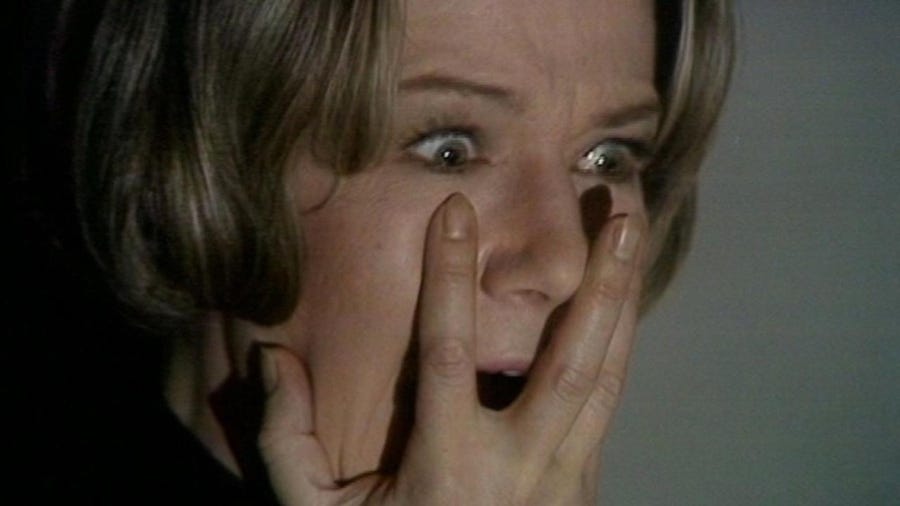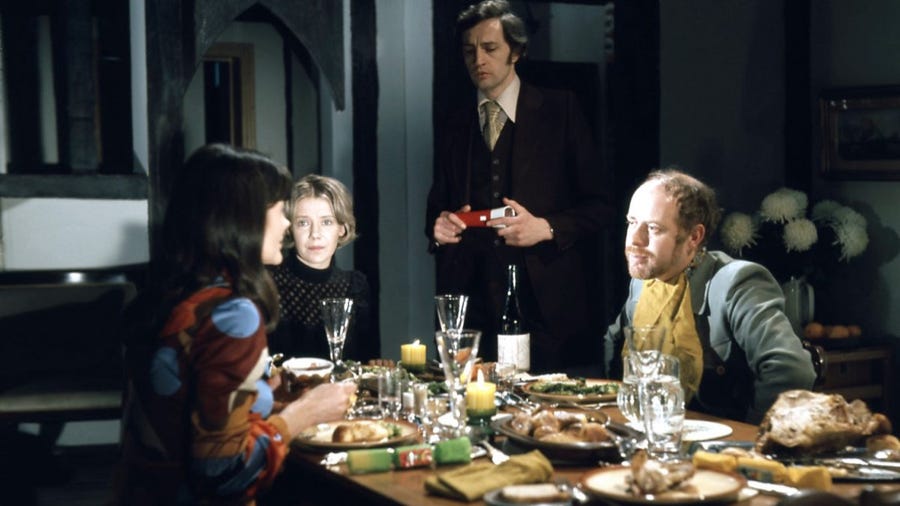“It wasn't much more than a ruin really... but we liked the area... and, anyway, Rachel fell in love with it."
But the weekend cottage is not quite the bargain it seemed, as Dan and Margaret find when they accept an invitation to go there for Christmas.From The Radio Times, November 1972.
Here’s a ghostly — and rather entertaining — little tale for Christmas. A bonus post for the paid subscribers. It’s The Exorcism, a stand-alone teleplay from the BBC television anthology Dead of Night, a series of seven ghost stories (three surviving), first broadcast on BBC1 (despite the Christmas setting) on Bonfire Night, 1972, and then repeated on Boxing Day, the following year. Don Taylor was the writer and director, described in his Guardian obituary as a ‘troubled socialist’. In For Tea on a Sunday (1963) the hero smashes up his friend’s flat with an axe, foretelling, I quote, ‘the coming rage of a world torn apart by capitalism…’
In The Exorcism (1972), two affluent married, middle-class couples (Edmund and Rachel, Dan and Margaret) spend Christmas at a ‘weekend’ cottage in remote, rural Suffolk. We’re in early 70s Islington intelligentsia territory. Or Hampstead, perhaps, or Stockwell Park Crescent — you know the type: a nicely renovated 1840s-ish villa (stucco and creamy London brick), a freshly-ironed copy of The Guardian delivered every morning through the shiny letterbox, a mortgage and an overdraft, William Morris wallpaper, stacks of hardbacks (an account at Hatchard’s), theatrical tinsel pictures with bird’s eye maple frames, muesli and a kitchen of scrubbed pine, blue and white Copenhagen and a coffee percolator in red enamel (from the Habitat catalogue). In the playroom (sorry, nursery), there’s a plummy ten-year-old daughter (Alice band) playing with her Pollock’s Toy Theatre, and in the ‘fridge, a dubious, white-coloured liquid in a screw-top jar. Mummy’s milk.
Edmund (Edward Petheridge) is a late-thirties, pin-striped something in advertising, marketing or PR. And he's first generation Oxbridge (not that you would know it, especially), from a working-class background, with an Old Labour father — for as Sir Roy Strong once said in a radio interview with Robert Elms, discussing his change of vowels: "Unlike yours, our generation had to". Edmund's wife, Rachel (Anna Cropper), plays the clavichord. Dead trendy in the late 60s and early 70s, like a Bach LP by Deutsche Grammophon. Need I say more? The other couple: I'm not sure what he does, but Dan's (Clive Swift) some sort of writer or colour supplement journalist (he also writes for The New Statesman), there's a silk cravat thing and a trouser suit and a goatee beard, and his blasé, strangely attractive, chain-smoking wife, Margaret (Sylvia Kay), wears a Leonard of Paris or Pucci silk dress. Cartier or Sotheby's cigarettes? Despite the writing credentials, they're the more bourgeoise of the two. Anyway, Edmund and Rachel have just 'discovered' the cottage and done it up, 'converted' it at some expense. There's a Volvo Estate and a Jag parked outside.
The bearded Dan is, frankly, a bit of a wanker. There's a hint of kinky humiliation (under the excuse of psychological experiment) going on with Margaret, his wife. Not that they're exactly tossing their car keys into a goldfish bowl — although thinking about it, he does look a bit like the bloke from The Joy of Sex (1972) — but she's kinda bugging too. Edmund and Rachel are the preferable couple.
Keep reading with a 7-day free trial
Subscribe to Luke Honey's WEEKEND FLICKS. to keep reading this post and get 7 days of free access to the full post archives.






